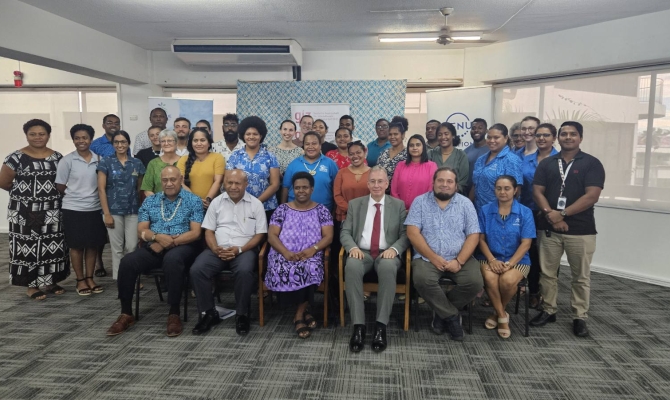
Twenty-one percent of seagrass species are categorised as Near Threatened, Vulnerable and Endangered Species on the International Union for Conservation of Nature Red List of Threatened Species. It is estimated that seven percent of this key marine habitat is being lost worldwide every year.
The Secretariat of the Pacific Regional Environment Programme (SPREP) is working with many partners and Pacific communities to raise awareness and conservation of seagrass.
“Seagrass is a key part of the coastal ecosystem. Together with coral reefs and mangroves, seagrass forms the first line of defence in protecting coastal communities from impacts of storm surges,” said Dr Nicolas Rocle, Coastal and Marine Management Specialist at SPREP.
“They also have critical habitat values for marine species such as dugongs and turtles. Overall, the value of seagrass in site specific ecosystem services is immense in how it benefits our coastal communities and biodiversity.”
Celebrating the role of seagrass for our Pacific resilience has been the focus of a two-week long Pacific wide campaign. Aiming at building awareness of Pacific seagrass ecosystems, the campaign culminated in a talanoa session in Fiji convened to commemorate World Seagrass Day on 1 March 2024.
It was here that Pacific Community Acting Deputy Director General for Science and Capability, Ms Florence Rahiria, stressed how seagrass ecosystems are still underestimated or marginalised in conservation legislation and policy.
“Therefore, let us heed the call to action whether it is adopting sustainable practices, supporting research, or advocating for change, every action counts,” Rahiria shared.
“Our individual and collective contributions hold the power to effect transformative change and secure the future of seagrass ecosystems”.
Rahiria added traditional knowledge is proving to be a powerful tool for managing these ecosystems, often surpassing modern approaches.
“This is a testament to the deep connection between Pacific Islanders and their environment".
“It is incumbent upon us to promote their significance, educate our communities, and advocate for their protection".
In his address, German Ambassador to Fiji, His Excellency Dr Andreas Prothmann talked about the loss and degradation of seagrass ecosystems, and the importance of critically considering strategies on seagrass conservation.
“Seagrass conservation is crucial for the achievement of the mitigation goals of the Paris Agreement on climate change,” Ambassador Prothmann said.
He encouraged partners in the Pacific to anchor the importance of seagrass in national policies and priorities.
“It is pivotal that we raise the profile of seagrass ecosystems and their role in climate mitigation as well as providing ecosystem goods and services”.
Ambassador Prothmann also acknowledged the participation of women in the conservation efforts of seagrass in the Pacific.
“Women in fisheries, whether they are marine scientists, fisherwomen, or seafood vendors, are important stakeholders in the conservation efforts of coastal ecosystems. Therefore, their participation should be valued and appreciated".
Hosted by the Management and Conservation of Blue Carbon Ecosystems (MACBLUE) project, the talanoa session was aimed at celebrating the importance of seagrasses, exchange on conservation practices in Pacific islands countries and fostering global collaboration for their protection.
Speakers included Dr. Shalini Singh, Associate Professor, College of Agriculture, Fisheries and Forestry of the Fiji National University, Mazzella Maniwavie, Programme Manager, The Nature Conservancy Papua New Guinea, Henry Kaniki, Conservation Program Manager, WWF Solomon Islands and Falma Aiviji, Invertebrate Biologist, Vanuatu Department of Fisheries.
The MACBLUE project is jointly implemented by the Deutsche Gesellschaft für Internationale Zusammenarbeit (GIZ Pacific), Pacific Community and the Secretariat of the Pacific Regional Environment Programme.